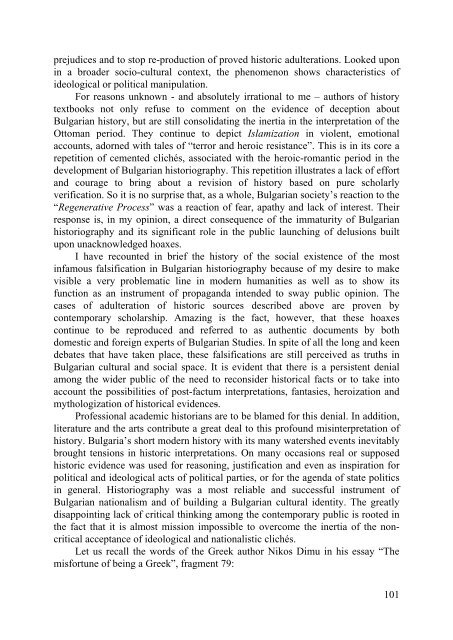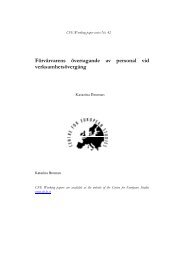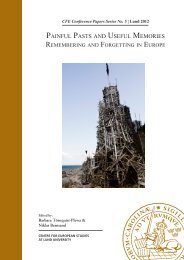MINNE OCH MANIPULATION - Centre for European Studies - Lunds ...
MINNE OCH MANIPULATION - Centre for European Studies - Lunds ...
MINNE OCH MANIPULATION - Centre for European Studies - Lunds ...
Create successful ePaper yourself
Turn your PDF publications into a flip-book with our unique Google optimized e-Paper software.
prejudices and to stop re-production of proved historic adulterations. Looked upon<br />
in a broader socio-cultural context, the phenomenon shows characteristics of<br />
ideological or political manipulation.<br />
For reasons unknown - and absolutely irrational to me – authors of history<br />
textbooks not only refuse to comment on the evidence of deception about<br />
Bulgarian history, but are still consolidating the inertia in the interpretation of the<br />
Ottoman period. They continue to depict Islamization in violent, emotional<br />
accounts, adorned with tales of “terror and heroic resistance”. This is in its core a<br />
repetition of cemented clichés, associated with the heroic-romantic period in the<br />
development of Bulgarian historiography. This repetition illustrates a lack of ef<strong>for</strong>t<br />
and courage to bring about a revision of history based on pure scholarly<br />
verification. So it is no surprise that, as a whole, Bulgarian society’s reaction to the<br />
“Regenerative Process” was a reaction of fear, apathy and lack of interest. Their<br />
response is, in my opinion, a direct consequence of the immaturity of Bulgarian<br />
historiography and its significant role in the public launching of delusions built<br />
upon unacknowledged hoaxes.<br />
I have recounted in brief the history of the social existence of the most<br />
infamous falsification in Bulgarian historiography because of my desire to make<br />
visible a very problematic line in modern humanities as well as to show its<br />
function as an instrument of propaganda intended to sway public opinion. The<br />
cases of adulteration of historic sources described above are proven by<br />
contemporary scholarship. Amazing is the fact, however, that these hoaxes<br />
continue to be reproduced and referred to as authentic documents by both<br />
domestic and <strong>for</strong>eign experts of Bulgarian <strong>Studies</strong>. In spite of all the long and keen<br />
debates that have taken place, these falsifications are still perceived as truths in<br />
Bulgarian cultural and social space. It is evident that there is a persistent denial<br />
among the wider public of the need to reconsider historical facts or to take into<br />
account the possibilities of post-factum interpretations, fantasies, heroization and<br />
mythologization of historical evidences.<br />
Professional academic historians are to be blamed <strong>for</strong> this denial. In addition,<br />
literature and the arts contribute a great deal to this profound misinterpretation of<br />
history. Bulgaria’s short modern history with its many watershed events inevitably<br />
brought tensions in historic interpretations. On many occasions real or supposed<br />
historic evidence was used <strong>for</strong> reasoning, justification and even as inspiration <strong>for</strong><br />
political and ideological acts of political parties, or <strong>for</strong> the agenda of state politics<br />
in general. Historiography was a most reliable and successful instrument of<br />
Bulgarian nationalism and of building a Bulgarian cultural identity. The greatly<br />
disappointing lack of critical thinking among the contemporary public is rooted in<br />
the fact that it is almost mission impossible to overcome the inertia of the noncritical<br />
acceptance of ideological and nationalistic clichés.<br />
Let us recall the words of the Greek author Nikos Dimu in his essay “The<br />
mis<strong>for</strong>tune of being a Greek”, fragment 79:<br />
101




